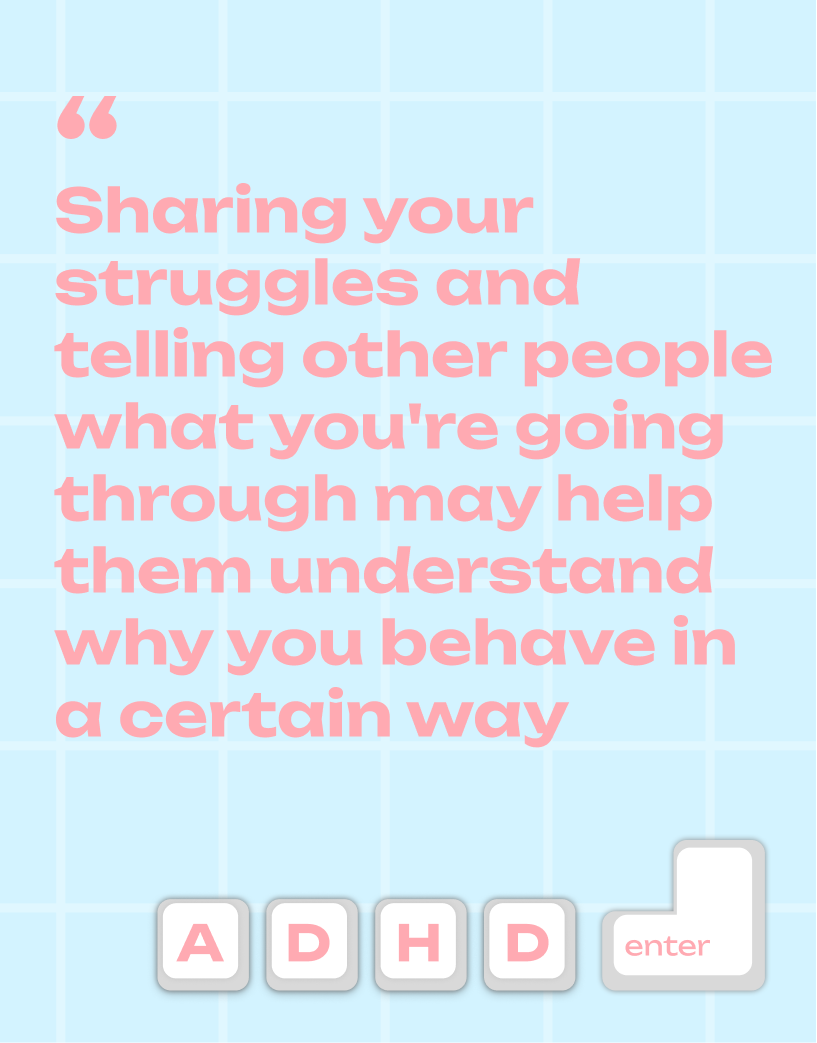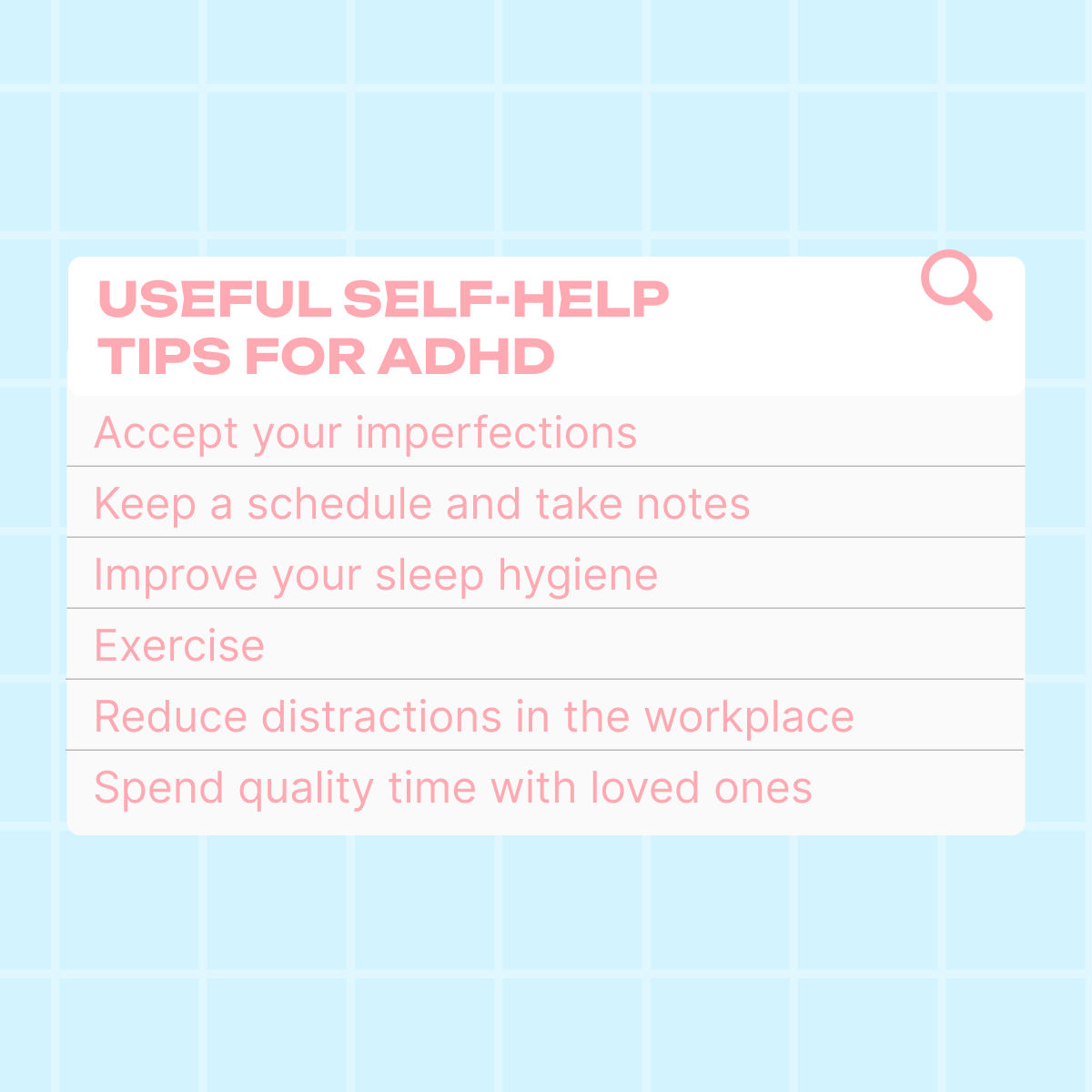Adult attention deficit hyperactivity disorder (ADHD) can significantly affect daily life. You might have trouble focusing, staying still, completing tasks, and even maintaining relationships. You might also experience
ADHD medication is the most common treatment option for managing ADHD symptoms. But, even though it is highly helpful in reducing symptoms, it is not a miracle cure and not the only way to improve your state. For better efficacy, it can be combined with psychotherapy and diverse ADHD self-help techniques.
In the article below, you will find some tips that can help with ADHD symptoms and make your life easier.
Despite its lifelong nature, ADHD can be managed. Seek help from our experts.

How to Manage ADHD With New Daily Routines
There are several skills and self-help ADHD techniques
Yet, change won’t happen suddenly. If you want these methods to be successful, focus on persistence, perseverance, and, most importantly, a positive outlook.
1. Accept your imperfections
This is the first of ADHD tips because it will help you reduce despair and anxiety brought on by your symptoms. The disorder can make it difficult to maintain neurotypical routines and norms. But, even though society frequently penalizes those who deviate from them, not all of these standards are necessary.
You may find yourself trying harder but still failing to match these artificial demands, and it can lead to frustration and self-loathing. So, give yourself more time to obtain new habits and practice self-compassion along the way. And note that you may keep some of your routines as they are if they are not harmful to others or your well-being.
2. Keep a schedule to develop organizational skills
Adults with ADHD often have difficulty organizing their schedules and activities. To better plan and prioritize your tasks, make handwritten or digital lists and keep that information at hand. Also, take time each day to update your schedule. Additionally, breaking down tasks into smaller, more manageable subtasks can help reduce feelings of overwhelm and make it easier to tackle each task. You will need some persistence at first and do it consistently to create a habit. However, then it will become as effortless as brushing your teeth.
3. Use visual clues to overcome your forgetfulness
As per the
Forgetting things is a serious symptom of ADHD. MEDvidi doctors are here to help.
4. Improve your sleep hygiene
According to a
5. Spend quality time with your loved ones
Your relationships may suffer because of your ADHD. Delaying a long-awaited rendezvous or forgetting to call a friend or a family member might strain your connections and make you feel lonely. Set aside a set time each day for socializing. Simple text messages, phone calls, or in-person meetings can improve your mood and overall well-being.
6. Set up your workplace to reduce distractions
Having a quiet or even private office can help the person with ADHD to lessen disruption at work. ADHD adults might have trouble focusing and are susceptible to being easily distracted by office activities and noise. They can choose a more silent office area or use noise-canceling headphones as a solution.
On the other hand, adults with ADHD might show
7. Figure out your ideal stimulation level
Although ADHD has a set of distinct symptoms, each person is different and has various demands. For example, some people need background noise to concentrate on work, while others need silence to stay focused. Learn what works for you through trial and error. Then, organize your workspace so that it meets their demands. Be adaptable and modify your system as necessary, considering your needs may vary.
Your impulsivity is manageable. To get personalized help, seek treatment at MEDvidi.

8. Work on extending your attention span
You might find it difficult to maintain focus, especially if the activity isn’t extremely interesting to you. Follow these pieces of advice to sharpen your concentration and extend your attention span:
- Take notes while actively listening and use them as a guide to stay on track.
- If someone gives you verbal instructions, repeat them aloud to ensure that you understood them.
- Impose deadlines on yourself. Deadlines give you a clear objective and might aid with time management.
9. Manage your impulsivity
Impulsive behavior is challenging to manage. Give yourself a required cooling-off period whenever you are about to make an impulsive choice or sign up for something on the spur of the moment. Try to wait at least 24 hours before getting started. If you genuinely “need” it, the desire remains. Moreover, practice recognizing your impulsive behavior by outlining the circumstance, your pre-action feelings, and what you should do differently the next time to stop the impulsive action.
10. Exercise
Anxiety and restlessness that fuel impulsive actions can be eliminated with regular exercise. Try to spend 20 minutes each day doing something you like. For significant advantages, even a daily walk is sufficient. Also, your capacity to think things through before acting is enhanced by regular meditation. You can begin with just two to three minutes each day and work your way up to ten to twenty.
Final Words
When you have ADHD, many symptoms of the disorder may affect your daily life. Use the above ADHD tips and any other strategies you find effective to feel and function better. Also, sharing your struggles and telling other people what you’re going through may help them understand why you behave in a certain way and support your aim to implement new routines. Finally, if you find it difficult to stay on track, consider seeking help from a mental health professional to develop working solutions specific to your needs.













